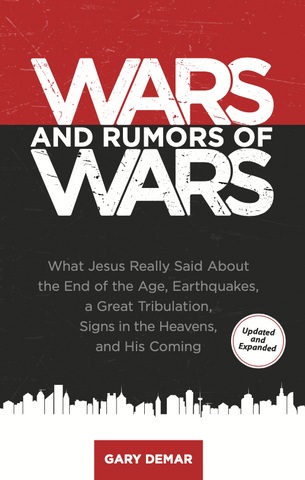Gary answers a listener question regarding Matthew 24:29-31.
Jesus’ disciples did not inquire about the end of the world (kosmos), but about the end of that covenant age (aion). When the tribulation of “those days” was completed, the religious and political structure of Israel as a covenant nation came to an end before that first-century generation passed away. Even futurists do not see Matthew 24:29 as being a description of the end of the world, since a thousand-year earthly millennium is said to follow immediately after their future version of the Great Tribulation with a renovated heaven and earth to follow.
The biblical approach is to follow the Bible’s own interpretive methodology of how sun, moon, and stars apply to the temporal judgment of nations (Isa. 13:10-13; 24:19-23; 34:4; Ezek. 32:6-8; Joel 2:10, 30-31; 3:15-16; Hab. 3:6-11). In none of these passages is the destruction of the earth in view even though destructive cosmic language is used. [1] Consider the following comment from the great Puritan commentator John Owen:
Not to hold you too long upon what is so plain and evident, you may take it for a rule, that, in the denunciations of the judgments of God, through all the prophets, heaven, sun, moon, stars, and the like appearing beauties and glories of the aspectable [seen] heavens, are taken for governments, governors, dominions in political states, as Isa. 14:1215; Jer 15:9, 51:25. Isaiah 13:13; Ps. 68:6; Joel 2:10; Rev. 8:12; Matt. 24:29; Luke 21:25; Isa 60:20; Obad. 4; Rev 8:13; 11:12; 20:11.10. [2]
What’s true of sun, moon, and stars, [3] representing the nation of Israel, is also true of “the powers of the heavens [that] will be shaken.” With this type of language, “God is redrawing the map of world politics, and the familiar structures of international affairs will never be the same again.” [4] The power structures of the Old Covenant were about to pass away and the existing political order. This power struggle begins when Jesus was brought before the religious and secular powers of the day and the people chose Barabbas and Caesar over Jesus (Matt. 27:16-21; John 19:15). This confrontation continues in the book of Acts. Peter and John are arrested (Acts 4:3). Stephen is stoned to death (7:54-60). Paul and his compatriots are accused of “upset[ting] the world” and “acting contrary to the decrees of Caesar, saying that there is another king, Jesus’” (Acts 17:6-7). The book of Acts ends with Paul “peaching the kingdom of God, and teaching concerning the Lord Jesus Christ, with all openness, unhindered” (28:31; also v. 23 and 20:25).

Wars and Rumors of Wars
A first-century interpretation of the Olivet Discourse was once common in commentaries and narrative-style books that describe the fall of Jerusalem in AD 70. There is also a history of skeptics who turn to Bible prophecy and claim Jesus was wrong about the timing of His coming at ‘the end of the age’ and the signs associated with it. A mountain of scholarship shows that the prophecy given by Jesus was fulfilled in exacting detail when He said it would: before the generation of those to whom He was speaking passed away.
Buy NowGary answers a listener question regarding Matthew 24:29-31. Did stars fall from the sky and did the angels gather the elect in AD 70? If so, how? When interpreting Scripture, we must not let the events change the time. If a particular event doesn’t meet our expectations, we need to ask why according to the rest of the Bible, not our assumptions. The time texts constrain the events to a particular timeframe. “This generation,” “immediately,” “right at the door,” and other phrases indicate when the events mentioned in Matthew 24 will happen.
Click here for today’s episode
Click here to browse all episodes of The Gary DeMar Podcast
[1] George Eldon Ladd, Jesus and the Kingdom: The Eschatology of Biblical Realism (New York: Harper & Row, 1964), chap. 2.
[2] John Owen, “Shaking and Translating of Heaven and Earth” (April 19, 1649), The Works of John Owen (New York: Robert Carter and Brothers, 1851), 8:255.
[3] “Only a pitiful prosiness could imagine that Jesus meant an actual dropping of the stars upon the earth.” D. Lamont, Christ and the World of Thought (Edinburgh, 1934), 266. Quoted in R. T. France, The Gospel of Mark: A Commentary on the Greek Text (Grand Rapids, MI: Eerdmans, 2002), 533, note 11.
[4] France, The Gospel of Mark, 533.

